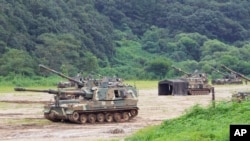The United States and South Korea on Monday began their largest joint military exercises in years to counter the “evolving threat from North Korea,” according to South Korean officials.
The U.S.-South Korea drills, which will last two weeks, will include field training programs simulating various scenarios, including responding to North Korean attacks on vital South Korean infrastructure.
The two allies had scaled back or postponed drills since 2017 as part of efforts to lure North Korea to the negotiating table, and due to the coronavirus pandemic.
However, South Korean President Yoon Suk Yeol, who took office in May, has vowed to boost the exercises to deter North Korea, which has conducted a record number of missile launches this year.
Although the United States and South Korea say the drills are defensive, North Korea portrays them as preparation to invade and often uses them as an occasion to demonstrate its own weapons and make other threats.
This year, North Korea has conducted more than 30 launches, including intercontinental ballistic missiles designed to target the United States. Other tests have involved short-range weapons meant to evade U.S. and South Korean missile defenses.
U.S. and South Korean officials also say North Korea could conduct a seventh nuclear test at any moment – a step that could dramatically raise tensions on the Korean Peninsula. North Korea has not tested a nuclear weapon since 2017.
The United States and South Korea have agreed they would respond to a North Korean nuclear test by deploying “strategic assets” to the region, South Korea’s Ministry of National Defense said last week. “Strategic assets” can refer to weapons systems including nuclear-capable bombers, nuclear-powered submarines, or aircraft carriers.
South Korea does not have its own nuclear weapons, but relies on the so-called U.S. “nuclear umbrella” for protection. The United States also has about 28,500 troops in South Korea.
Before 2017, the two countries held annual spring and summer joint exercises designed to enhance the ability of the two sides to work together in the event of a war.







